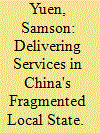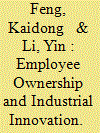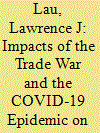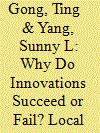|
|
|
Sort Order |
|
|
|
Items / Page
|
|
|
|
|
|
|
| Srl | Item |
| 1 |
ID:
177632


|
|
|
| 2 |
ID:
177626


|
|
|
|
|
| Summary/Abstract |
Overseas cadre training is a highly institutionalized arrangement that the Chinese Communist Party has employed to learn state-of-the-art governing skills from around the world. One of the greatest challenges of dispatching numerous party and state cadres abroad is to ensure their faithfulness to authoritarian rule without being "infiltrated by the West." By examining the routine management of overseas training programs and the state control mechanisms toward trainees, this article suggests that immersing in the Western environment and being trained at established democracies does not necessarily give rise to an appreciation of democratic values and norms among Chinese political elites. On the contrary, overseas training, as a means of nurturing talented cadres, rewarding loyal veteran party members, and shaping trainees' perceptions of democratic societies, plays a pivotal role in strengthening the attendees' confidence in the party-state, which may eventually assist the Communist Party in consolidating its ruling ideology and authoritarian rule.
|
|
|
|
|
|
|
|
|
|
|
|
|
|
|
|
| 3 |
ID:
177628


|
|
|
|
|
| Summary/Abstract |
Local states in China are increasingly active in delivering social services through formal collaborations with NGOs. However, existing studies tend to treat the local state as a unitary actor, concealing how the dynamics of its different institutional layers shape NGO behavior. Focusing on the government procurement of social work NGOs in Guangzhou through case studies, this article analyzes how different local state institutions in the administrative hierarchy influence NGOs through disparate policy imperatives. While Street Offices consider NGOs as "administrative arms," the municipal government aims to cultivate their professional capacity for invigorating community services. Although NGOs manipulate such dynamics to prolong survival, these strategies in turn embed them in the local state and shape them into acquiescent service providers. The findings suggest that China's top-down community governance reforms through NGOs is circumscribed by misaligned policy objectives and wide demographic variation across neighborhoods. They also caution us from seeing state-NGO collaborations as a sign of an expanding civil society.
|
|
|
|
|
|
|
|
|
|
|
|
|
|
|
|
| 4 |
ID:
177624


|
|
|
|
|
| Summary/Abstract |
Huawei Technologies, the Chinese telecommunication technology giant that was put into the U.S. government's Entity List from May 2019, has become a contested issue in the emerging U.S.-China technology rivalry. In particular, the U.S. government and Western academics have viewed Huawei's unique employee ownership as an opaque structure subject to the influence of the Chinese state. In this article, we draw on a variety of data sources, including historical archives, interviews with corporate executives, and official government data, to provide a full account of Huawei's employee ownership, including its history, structure, and function. We examine popular misconceptions of Huawei's innovative capabilities and corporate structure, showing that these arguments have generally lacked awareness of the innovation process and corporate governance in the historical context of China's reform. Based on a theory of innovative enterprise, we provide an explanation on how employee ownership has helped Huawei to incentivize a massive engineering workforce and build an innovative organization to succeed in the competitive high-tech industries.
|
|
|
|
|
|
|
|
|
|
|
|
|
|
|
|
| 5 |
ID:
177623


|
|
|
|
|
| Summary/Abstract |
The China-U.S. trade war reduced the Chinese growth rate from 6.9 percent in 2017 to 6.1 percent in 2019. The COVID-19 epidemic has lowered the rate further to 1.8 percent in the first half of 2020 and to a projected 3.4 percent for 2020 as a whole. The trade war caused only a very slight decline in the U.S. growth rate in 2019, but the COVID-19 epidemic has resulted in a projected contraction of 5.3 percent in 2020. Assuming that half of the Chinese exports to the United States were halted, it would imply a total loss of Chinese GDP of almost 1 percent, or approximately US$135 billion (in 2019 prices). Assuming that half of U.S. exports of goods to China were halted, it would imply a loss of U.S. GDP of 0.22 percent, or approximately US$47 billion. The costs of the trade war are higher for China than for the United States both absolutely and relatively. The loss of Chinese GDP due to COVID-19 in 2020 may be estimated as 3.5 percent of its 2019 value, or US$0.5 trillion. The corresponding loss of U.S. GDP may be estimated as 8.1 percent of its 2019 value, or US$1.73 trillion.
|
|
|
|
|
|
|
|
|
|
|
|
|
|
|
|
| 6 |
ID:
177630


|
|
|
|
|
| Summary/Abstract |
Chinese scholars have cordially insisted on the tangible economic benefits of the Belt and Road Initiative (BRI). However, their counterparts outside China mostly focus on BRI's revisionist outcome. This dichotomy in the BRI study testifies to a security dilemma embedded in the geostrategic tug-of-war between China and the United States. The U.S. Indo-Pacific Strategy (IPS) openly postulates a "pushback" of the BRI, which further highlights China's potent vulnerability in BRI expansion along with the critical choke points in both global waterways and through continental masses. As the BRI's military geography overlaps its geostrategic reach, the military factor is relevant. This article holds that it is plausible to assess the likely BRI geostrategic effects with the instruments of international relations theories, such as geopolitics. This article evaluates the BRI's well-being from a military standpoint that reflects the great power rivalry. The BRI's inherent military-security ramifications contribute to the restructuring of the existing geopolitical order across the Eurasian continents. A major security challenge for the BRI is the IPS's security/defense connectivity that may point to a new pattern of coordinated military balancing against China in general and its BRI expansion in particular. The People's Liberation Army (PLA) will be logically tasked to protect the BRI through capability enhancement and overseas presence.
|
|
|
|
|
|
|
|
|
|
|
|
|
|
|
|
| 7 |
ID:
177633


|
|
|
| 8 |
ID:
177627


|
|
|
|
|
| Summary/Abstract |
Local cadres in China form innovation partnerships with social workers from Hong Kong (HK) to learn new knowledge regarding public service delivery. How do cadres perceive and process information from HK social workers? How do cadres influence meaning construction towards a preferred redefinition? How do cadres reproduce new knowledge to guide real practice? This study answers these questions by scrutinizing the interactions between local cadres and HK social workers in their sense-making of three concepts, namely, innovation, indigenization, and professionalism. This study finds that mainland local cadres' views regarding the three concepts considerably differ from the views held by HK social workers. Thus, cadres exert strenuous efforts to reshape social workers' understanding to ensure that the introduction of new knowledge by this group of professionals conforms to the government's prior-set objectives and agenda. The dominance of cadres reduces the uncertainty involved in learning and, thus, enhances their receptivity to new knowledge but simultaneously curtails diversity and elasticity in government knowledge absorption, which decreases the prospect of double loop learning. Moreover, the serious power asymmetry between government cadres and social workers (both overseas and local) is reinforced in the knowledge absorption and reproduction processes.
|
|
|
|
|
|
|
|
|
|
|
|
|
|
|
|
| 9 |
ID:
177631


|
|
|
|
|
| Summary/Abstract |
How the small states bordering China study their giant neighbor and how they develop the discipline that brought crucial impacts to their China policies have been ignored by scholars in social sciences and area studies. This article focuses on Vietnam, a nation that has developed its own special characteristics of Sinology because of the country's distinctive historical experience and close ties with China. This study introduces the different but equally remarkable training styles of Vietnamese sinologists through two analytical threads, namely, systematic training and cultural heritage. In addition to presenting the cases of Vietnamese Sinology, this study also compares the cases of Sinological developments in other East Asian countries. Through investigation and comparison, the current research is optimistic that it can show how and why Vietnamese Sinology has maintained its richness and diversity despite the domestic and international political upheavals that this field has encountered. This research further argues that the diverse resources accumulated in the evolution of north and south Sinology enable Vietnam to maintain flexibility when interacting with China.
|
|
|
|
|
|
|
|
|
|
|
|
|
|
|
|
| 10 |
ID:
177629


|
|
|
|
|
| Summary/Abstract |
Nongovernmental stakeholders are sometimes able to change policy outcomes under certain conditions in environmental conflicts in China, a circumstance contradictory to the theory of the policy process in authoritarian regimes that we describe as conditional government responsiveness. By applying qualitative comparative analysis (QCA), this article suggests stakeholders can use the same mechanisms to signal their preferences as in democracy. Nevertheless, as government accountability is upward under China's regional decentralized authoritarian (RDA) regime, policy change as a kind of government responsiveness is conditional, which distinguishes China from a democracy or a typical politically closed authoritarian state.
|
|
|
|
|
|
|
|
|
|
|
|
|
|
|
|
| 11 |
ID:
177625


|
|
|
|
|
| Summary/Abstract |
Local innovations have proliferated in China in recent years. The huge universe of local initiatives results from economic and administrative decentralization. Various challenges facing China's unprecedented market-driven reform invite innovative solutions as well. What happens to the innovations after they were launched? Are they institutionalized locally and diffused nationwide? Or do they merely perform the function of window dressing and fail to achieve anything? Drawing on in-depth case studies of local anti-corruption reform, this article attempts to address these questions. It offers a two-dimensional conceptual framework of institutionalization and diffusion to examine what has happened to locally initiated anti-corruption measures. On that basis, a fourfold classification of innovation trajectories is identified to help explain why some innovations have suceeded while others failed. The findings indicate that local innovations have different developmental trajectories not so much because of their internal characteristics but because of the contextual constraints they face. Policy innovation is more of a process of political construction than a process of selecting better policy tools. This may be particularly true for anti-corruption reform that, as our cases show, requires strong political will, public embracement, and legal support.
|
|
|
|
|
|
|
|
|
|
|
|
|
|
|
|
|
|
|
|
|